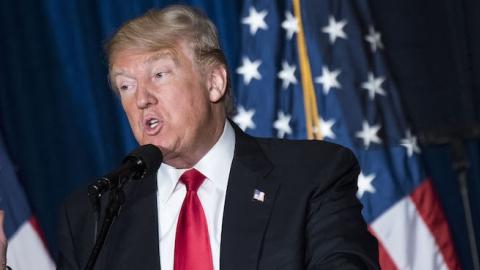Come this fall, Republicans may be tempted to trumpet the slogan “no third term for Obama” to help justify a vote for Donald Trump. That slogan might not hit the mark, however, if we are to judge by the GOP presumptive nominee’s April 27 foreign policy speech to the Center for the National Interest. Buried beneath the invective, one can discern Trump’s actual agreement with fundamental elements of President Obama’s attitude toward national security issues. What differences we do see arise primarily from their varying rhetorical styles (bombastic nationalism as opposed to cool realism)—and perhaps even from Trump’s greater consistency in applying the Obama approach.
In his interview with The Atlantic's Jeffrey Goldberg, President Obama claimed that on August 30, 2013, when he reversed course on enforcing his red line against Syrian president Bashar al-Assad’s use of chemical weapons, he threw away the “Washington playbook,” the conventional wisdom of the capital’s foreign-policy “establishment.” In Obama’s mind, says Goldberg, that day—seven months into his second term—was his “liberation day.” In his speech, Trump seemed to say he wouldn’t wait that long: He has already expressed his contempt for those “who have perfect resumes but very little to brag about except responsibility for…failed policies and continued losses at war.”
The more one delves into the basis for each man’s dismissal of the conventional wisdom on foreign policy, the more similar the basic building blocks begin to look. Trump has no use for the term “nation building,” so he won’t be adopting the line that we need it here at home rather than abroad. But he argues that our resources are overextended and our priority has to be on building up our own economic might. His focus on the trade deficit as the main obstacle to that goal does indeed differ from Obama’s focus. But he has also de-emphasized standard GOP policy issues like overregulation, a perverse tax code, and crony capitalism.
Trump’s replacement concept for “nation-building business” is a focus on “creating stability in the world.” A New York Times editorial took him to task on this point, saying that he failed to clarify the difference between the two goals. But in context Trump’s meaning was clear enough: We should give up goals like promoting democracy, development of civil society, and respect for human rights, and instead support rulers, like the late Muammar Qaddafi, who can keep things under control. As President Obama has himself taken to “joking privately,” according to Goldberg’s article, “All I need in the Middle East is a few smart autocrats.”
Trump’s assertion that we are overextending our resources is linked to a complaint about “free riding” by our allies. President Obama had been more circumspect in this regard, but he took the gloves off in the Atlantic interview: “Free riders aggravate me,” Obama said, referring, in the first instance, to Great Britain, but applying the phrase to other European and Gulf Arab allies as well. As Goldberg notes, Obama has recognized America’s indispensability, but he resents rather than embraces it. Trump, perhaps more consistently, simply seems not to care.
Trump charges that as a result of Obama’s policies “our friends are beginning to think they can’t depend on us,” but he juxtaposes that criticism to a declaration that we “must be prepared to let [our allies] defend themselves” if they aren’t willing to pay up for the military capabilities with which we provide their (as well as our own) defense. His general attitude toward allies does not seem very different from Obama’s; his actions, however, might be more consistently negative. (Israel might be an exception, depending on how his real view, assuming he has one, lines up against his two stated positions: “neutrality” between Israel and the Palestinians, or the strong support implied by his criticism of the Obama Administration for not being a friend of Israel.)
If Trump shares Obama’s dim view of our allies, he is less favorable, at least in some respects, to our enemies. Nevertheless, his usual complaint is that Obama hasn’t been a tough enough negotiator: Trump, of course, has great confidence in his skill as a negotiator, but if he can’t reach a deal, his solution is to walk away from the table. Thus, he puts forward his own version of a “reset” with Russia. He thinks that under the pressure of tough negotiations, the Russians will be “reasonable.” If not, “then we will quickly walk from the table.” Obama thought the same, although he viewed his ace in the hole as being not so much his skill as a negotiator but his not being George W. Bush.
Similarly, Trump holds that if we are “strong and smart” there is no reason we can’t find a “better friend” in China; if not, “we can both go our separate ways.” But the issue to be negotiated, it would seem, is the trade deficit (and perhaps intellectual property theft): He does not seem to consider China’s geopolitical machinations, for example in the South China Sea, a problem.
With respect to Iran, Trump seems to see the problem as being an insufficiently tough negotiating posture: “The Iran deal, like so many of our worst agreements, is the result of not being willing to leave the table. When the other side knows you’re not going to walk, it becomes absolutely impossible to win.” But walking away—however sensible if the alternative is a bad deal—doesn’t resolve the problem: You have to figure out how to achieve your objective in some other manner.
If you can’t reach an agreement with the landowner to build an apartment house on West 57th Street, you can always shift your attention to a parcel on Central Park West. If you make money developing that plot, your failure to develop the first one doesn’t matter. But national security policy is not analogous. If we can’t reach a deal with Russia, China, or Iran, they don’t go away; we still have to deal with them. The idea that we must patiently and persistently build up positions of strength—militarily but even more important politically and diplomatically—seems to have gone missing.
Trump’s biggest departure from Obama policy is summarized in his rejection of the “false song of globalism.” Obama’s “globalism” is most evident with respect to climate change, free trade, and immigration. While Trump seems to be reconsidering his earlier dismissal of climate change as a “hoax,” his rejection of Obama’s approaches to the other two issues is clear. Obama’s support for free trade seems to be a last remnant of a belief that the United States has a major responsibility for upholding a liberal world order: If Trump’s reasoning made economic sense (an admittedly dubious proposition), abandoning that responsibility would probably be more consistent with Obama’s overall worldview than retaining it. On immigration (aside from any domestic political considerations), Trump again seems to be a more Obamian than Obama: If we are willing not to act as hundreds of thousands of Syrian are slaughtered in Syria, how compelling can the moral case for accepting thousands of them as refugees really be?
Hillary Clinton won’t be campaigning on a platform of “no third term for Obama.” But overall, at least as far as foreign policy is concerned, I suspect she might have as legitimate a right to do so as Trump.















